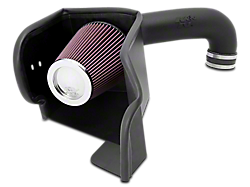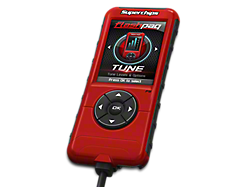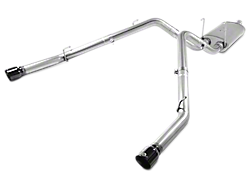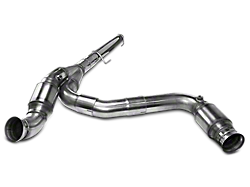Distributor-less Ignition Systems
The first distributor-less system implemented in the LS-based Sierra pickup truck used what GM called the 24X system. This system was based on a 2-piece, 24-tooth reluctor wheel pressed on to the crankshaft in a set relative position. A second reluctor wheel is machined into the camshaft. As the reluctor wheel rotates with the crankshaft, the ferrous teeth of it pass very closely to the crankshaft sensor, which induces a voltage in the sensor that is then transmitted to the powertrain control module. Based on the induced voltages and waveforms, the PCM is able to calculate engine RPM and crankshaft angle and thereby manage accordingly the necessary fuel and spark events for each individual cylinder.
Compared to a distributor system, the 24X coil-on-plug system provides vastly superior engine control because it does not rely on mechanical gears to control engine timing. Each cylinder has its own fuel injector and a coil-pack to supply electrical energy to the spark plug. 24X systems can work with both drive-by-wire and conventional cable throttle bodies.
In 2007 (earlier for non-truck applications), GMC upgraded to a 58X ignition system. Fundamentally working the same as the 24X ignition system, 58X uses a reluctor wheel designed to have 60 teeth, which equates to 6 degrees of rotation per tooth. However, there are in effect only 58 teeth on the wheel as two teeth are missing, and this gap in the teeth helps the PCM further determine the exact crankshaft angle. 58X also uses a camshaft sensor to provide additional resolution to the PCM, but it has been relocated to the front of the timing cover. In terms of throttle bodies, 58X is only compatible with drive-by-wire versions. Gen V LT-based engines (2013 and later) use the same 58X system as the Gen IV LS-based truck engines.
Both 24X and 58X are considerably more powerful systems than a conventional distributor and single coil pack. Timing with the digital ignition systems is not affected by the wear of mechanical gears (as can develop with a distributor) and high RPM spark output is significantly better. Distributor based ignition systems tend to suffer from distorted and scattered spark when operating at high RPM. 24X and 58X are specifically calibrated to their own PCM and harness and thus are not interchangeable without replacing the entirety of those aforementioned pieces.
The Importance of Ignition Coils
Both LS-based and LT-based Sierra pickups employ the use of coil-near-plug spark generation systems. The coil packs, dedicated one pack per cylinder, consist of an iron core surrounded by a primary and secondary winding. All of this is encapsulated in a plastic shell filled with epoxy to dampen engine and road vibrations. The primary windings around the iron core are made from a thicker diameter wire as compared to the secondary winding, but features fewer turns. The two windings are isolated from each other and at no point make contact.
Low voltage, via the PCM, is supplied to the primary winding which builds up a magnetic field around the iron core, turning the iron core into an electromagnetic. When the ignition controller cuts the voltage to the primary winding, the magnetic field around the iron core collapses, triggering an extremely high voltage in the secondary winding. It is this high voltage that is then transferred to the spark plug where it is able to jump the gap and create the spark to ignite the air-fuel mix in the combustion chamber.
Having an individual coil per spark plug reduces the load on each coil as the coil is only responsible for the ignition events of a single cylinder. Meanwhile, distributor systems that feature one coil for all the cylinders are always under higher load and have less time to recharge between ignition events. Overall, a multi-coil system like Sierra pickup trucks implement offers more consistent spark production, a hotter spark (less likely to foul plugs) and a reduced chance of high RPM misfires. Furthermore, the multi coil setup allows for cylinder deactivation, and, provides superior redundancy. If one coil fails, only one cylinder is lost – not the entire engine; you still will be able to limp home or to the garage.
On the Topic of Spark Plugs
High voltage ignition systems like GM’s 24X and 58X necessitates the implementation of a hardened spark plug. To this end, GMC has been equipping the Sierra 1500 with either platinum or iridium tipped spark plugs, gapped at .040”, dependent on model year. Much of a spark plug's longevity correlates directly to the sharpness of the electrode – i.e. a sharp electrode produces a clean and powerful spark. Regular copper plugs with a nickel alloy electrode tip quickly lose their sharpness and degrade in performance, especially when presented with the high voltage of a modern distributor-less ignition system.
Platinum tipped spark plugs use a similar copper core and electrode as that of a copper plug but then have a small disc of the precious metal tacked onto the very tip of the electrode. This results in a still highly conductive plug, but, platinum being harder than conventional nickel alloy, will endure the high voltage and temperatures of the combustion chamber for significantly longer before wearing and requiring replacement.
Iridium plugs take this concept one level above platinum as iridium is even harder than platinum. The result, in this case, is a very hard plug that wears extremely well, is difficult to foul and is capable of providing a hot and clean spark to ignite the combustion mix.
Refer to the owner’s manual in order to determine which type of plug your Sierra is equipped with.
Shop All Truck Accessories & Parts
Fitment Includes:
- 1994, 1995, 1996, 1997, 1998, 1999, 2000, 2001, 2002, 2003, 2004, 2005, 2006, 2007, 2008, 2009, 2010, 2011, 2012, 2013, 2014, 2015, 2016, 2017, 2018, 2019, 2020, 2021, 2022, 2023 and 2024 Dodge Ram 1500s
- Base, LT, ST, SLT/Sport/TRX, Laramie, R/T, Sport, SS/T 5.9L, WS, Laramie Longhorn, Tradesman Heavy Duty, Tradesman/Express, Tradesman, HFE, Rebel, Longhorn, SRT/10, 1500 SLT Plus, Daytona, Mega Cab Dodge Rams
- Engines: 3.0L EcoDiesel V6, 3.6L Pentastar V6, 3.7L V6, 3.9L V6, 4.7L V8, 5.7L Hemi V8, 3.7L Magnum V6, 4.7L Magnum V8, 5.2L V8, 5.9L Magnum V8 Ram Trucks
*Please see product pages for any exceptions






